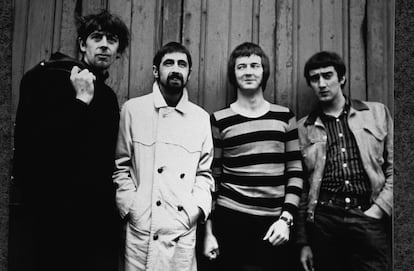John Mayall, the blues genius who let others shine
The English musician, who died at 90, had an enormous influence on the music scene of the sixties as well as being a unique talent scout, launching the careers of Eric Clapton, Peter Green and Mick Taylor from his band, the Bluesbreakers


It’s all very English, very sixties. A white man playing Chicago and Mississippi blues since he was a child, a succession of dazzling guitarists, a long career and a huge influence on what was being cooked up in London at the time. John Mayall, who died July 22 at the age of 90, is considered the godfather of British blues, and perhaps the godfather of all white man’s blues. He was a key figure in Swinging London, and later in California’s Laurel Canyon, but he did not seek the spotlight. He knew how to surround himself with geniuses and let them shine.
The version of the blues that he and several others had brought to the British Isles, when the genre was in a certain decline in the U.S., moulded that boisterous atmosphere from which the Rolling Stones, Animals, Yardbirds and, somewhat later, Led Zeppelin and Ten Years After emerged. The so-called British Invasion, the landing of these bands on the other side of the Atlantic in the wake of the Beatles, turned the history of the genre upside down. Those sounds, which originated in the plantations of the Mississippi Delta, had made a long trans-Atlantic round trip that allowed the white American public to rediscover true masters like Muddy Waters, BB King, Albert King and John Lee Hooker. It also facilitated the emergence of more (white) artists there who tapped into that (black) heritage: Janis Joplin, Canned Heat, The Doors, ZZ Top and Johnny Winter.
To understand the huge cultural and social phenomenon of sixties and seventies rock that round trip needs to be taken into account. At the beginning of the 1960s, Mayall was already into the blues, influenced by his music-loving father. And he was a precocious musician and multi-instrumentalist when some African-American figures played several discreet gigs in the UK. Mayall was John Lee Hooker’s opening act in 1961 and would later make a record with him, thanks to the fact that he was in that group of blues initiates. There were two other key elements: the singer and radio announcer Alexis Korner and harmonica player Cyril Davies, who brought records from the U.S. and were promoters of the band Blues Incorporated as well as opening the London Blues and Barrelhouse Club.
Korner brought Mayall into the London fold from Macclesfield, near Manchester. Other artists who would later become stars moved in too, such as Charlie Watts (Rolling Stones), Ginger Baker (Cream) and Eric Burdon (Animals). The Yardbirds, a band promoted by Davies, featured three tremendous guitarists: Eric Clapton, Jimmy Page and Jeff Beck. And Mayall’s Bluesbreakers featured over a brief period Eric Clapton himself, Peter Green — later founder of Fleetwood Mac — and Mick Taylor, who would end up in the Stones in their greatest period. These three, who were around or under 20, excelled on three essential albums: Bluesbreakers (with Eric Clapton), A Hard Road and Crusade, released between 1966 and 1967. Clapton played with Mayall again on occasion, but his time with the Bluesbreakers was as fleeting as it was memorable.
Mayall was not only a rounded musician and a great talent scout, he also made those who passed through his band better, offering them a favorable environment in which to grow. He encouraged Clapton from the beginning to attack the strings with more impetus; at that time graffiti appeared in London saying: “Clapton is God.” Of course, the fact Mayall took on these geniuses meant he was often left in the lurch. Eric himself deserted him to found Cream, without a backward glance. Green not only left the band, but took another key member along with him, bassist John McVie, and one of the drummers who worked on the Bluesbreakers sessions, Mick Fleetwood: it was his “favorite rhythm section,” the one that gave Fleetwood Mac its name. Later a mental health crisis forced Fleetwood to quit, and his band would have a new golden age with Stevie Nicks as lead singer. Meanwhile, Mick Taylor was recommended to the Stones by Mayall himself; that’s how generous he was.
Mayall remained faithful to his blues style throughout his life, although he made forays into jazz, folk and country. And he continued to recruit good musicians, though no longer with such mythical names: guitarists stopped being the great celebrities they were then. In the 1990s, he hooked up with a solvent Coco Montoya and from 2018 he incorporated a woman for the first time, Carolyn Wonderland. He toured until he was 88, with concerts that were as crowd-pleasing as they were honest.
Mayall’s sound was based on the blues that had come out of the U.S., but it had very British sound evident in the production of his first albums, with nods to the Brit pop of the day. And, of course, with a different style of singing. He said that his voice was white and very much so, and that he never set out to imitate the great Afro-American voices. But he added that his soul had some Black in it. There was a place for him in the Olympus of the blues, even if he refused to consider himself the genius that he was.
Sign up for our weekly newsletter to get more English-language news coverage from EL PAÍS USA Edition
Tu suscripción se está usando en otro dispositivo
¿Quieres añadir otro usuario a tu suscripción?
Si continúas leyendo en este dispositivo, no se podrá leer en el otro.
FlechaTu suscripción se está usando en otro dispositivo y solo puedes acceder a EL PAÍS desde un dispositivo a la vez.
Si quieres compartir tu cuenta, cambia tu suscripción a la modalidad Premium, así podrás añadir otro usuario. Cada uno accederá con su propia cuenta de email, lo que os permitirá personalizar vuestra experiencia en EL PAÍS.
¿Tienes una suscripción de empresa? Accede aquí para contratar más cuentas.
En el caso de no saber quién está usando tu cuenta, te recomendamos cambiar tu contraseña aquí.
Si decides continuar compartiendo tu cuenta, este mensaje se mostrará en tu dispositivo y en el de la otra persona que está usando tu cuenta de forma indefinida, afectando a tu experiencia de lectura. Puedes consultar aquí los términos y condiciones de la suscripción digital.








































